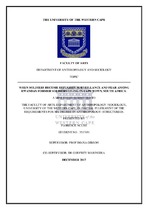| dc.contributor.advisor | Gibson, Diana | |
| dc.contributor.author | Ncube, Florence | |
| dc.date.accessioned | 2018-08-15T09:53:39Z | |
| dc.date.available | 2018-08-31T22:10:07Z | |
| dc.date.issued | 2017 | |
| dc.identifier.uri | http://hdl.handle.net/11394/6303 | |
| dc.description | Magister Artium - MA (Anthropology/Sociology) | |
| dc.description.abstract | This study examines the fears of Rwandan army deserters who oppose President Kagame, of
being found by the External Security Organisation (ESO), a Rwandan spy organisation meant
to sniff them out wherever they are in exile: in this case Cape Town, South Africa. The army
deserters are perceived as both a political and military threat to the survival of President
Kagame. I argue that the fear of being hunted is a real threat which (re)produces 'militarised
identities' as these former soldiers employ their military training skills to hide from the ESO
in South Africa. In this I employ Foucault's (1977) concept of 'panopticism' to examine these
army deserters' experiences of surveillance by the ESO and also Vigh's (2006) concept of
'social navigation' to understand how the army deserters 'scan' and manoeuvre the exile
terrain. In substantiating the thesis argument, my study draws from six in-depth interviews and
conversations with Rwandan army deserters living in Cape Town. It also made use of thematic
analysis, drawing themes from the data on which it is based. | |
| dc.language.iso | en | |
| dc.publisher | University of the Western Cape | |
| dc.subject | Army deserters, exile, surveillance, violence, Refugee | |
| dc.title | When soliders become refugees: Surveillance and fear among Rwandan former soliders living in Cape Town, South Africa | |
| dc.rights.holder | University of the Western Cape | |

